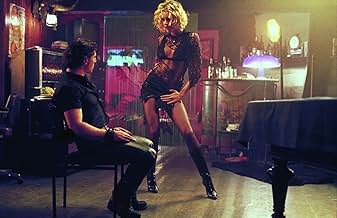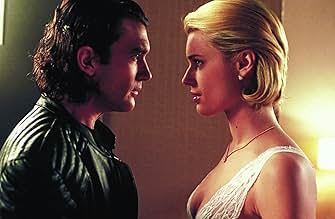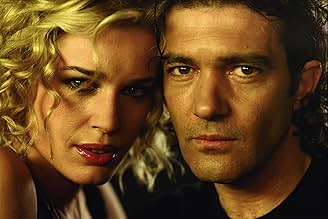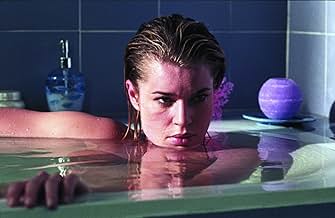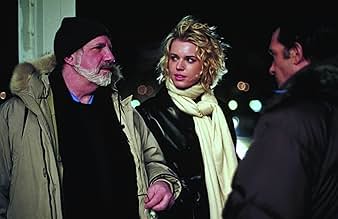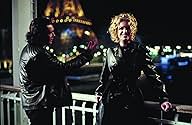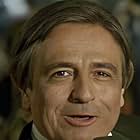A woman tries to straighten out her life, even as her past as a con-woman comes back to haunt her.A woman tries to straighten out her life, even as her past as a con-woman comes back to haunt her.A woman tries to straighten out her life, even as her past as a con-woman comes back to haunt her.
- Awards
- 2 wins & 4 nominations total
Rebecca Romijn
- Laure
- (as Rebecca Romijn-Stamos)
- …
Thierry Frémont
- Serra
- (as Thierry Fremont)
Jean-Marc Minéo
- Seated Guard
- (as Jean-Marc Mineo)
Stéphane Petit
- Bodyguard One
- (as Stephane Petit)
Éva Darlan
- Irma
- (as Eva Darlan)
Philippe Guégan
- Bespectacled Man
- (as Philippe Guegan)
- Director
- Writer
- All cast & crew
- Production, box office & more at IMDbPro
Featured reviews
You really have to admire Brian DePalma as a director. He's directed some of the finest thrillers in the last 30 years and even his misfires are interesting to watch like "Snake Eyes". I really enjoyed how well made this film is. If you don't like the story, thats your business. But this film is so finely detailed and shot that I put it in the same boat as "Mulholland Dr." and "Blackhawk Down". Interesting films that some viewers had mixed reactions to but the direction of these films was so expertly crafted that even the most ardent critics had to admit to the talent of the director. This film starts out at the Cannes Film Festival where a group of thieves are attempting to steal some diamonds off of a model by having Laure Ash (Rebecca Romijn-Stamos) seduce her in a lesbian encounter in the ladies bathroom. Things go wrong and Laure takes off with the diamonds. Seven years later Laure is married to an American diplomat and is in Paris with her husband when a papparazzi named Nicolas (Antonio Banderas) takes a picture of her. She doesn't want to be photographed because the former members of her gang are still looking for her. What I have just mentioned is just scratching the surface. This is a psychological thriller that has so many twists and turns that the casual film viewer will probably be in over their head. But this is a film that gives many hints along the way as you watch it. You have to pay attention to this film and one key scene takes place when Laure and Nicolas are having coffee in a cafe. Laure is sitting next to the window. Outside, a poster is being put up for a film called "Deja Vu" and the reflection of Laure on the glass is centered in the middle of the poster. DePalma uses many overhead shots to allow the viewer to get full view of certain scenes. Some viewers and critics have said they were disappointed with the casting but I admire the job that Rebecca did for this film. Okay, she's not Jodie Foster as far as being an actress is concerned but Foster couldn't exude sexuality like this if her life depended on it either. I thought it was believable that her character could manipulate Nicholas the way she did. How could he not? She was a combination of sexuality and vulnerability inside a very smart and devious mind. And for a film called "Femme Fatale" you had better find an actress that is smart and utterly beautiful at the same time. I found her performance to be bold and brave. DePalma uses each shot to send signals relating to the story. It sounds like a very difficult shoot because each scene has so much meaning. He doesn't have cameras following characters for nothing. Each shot has a reason. The details to this filming are enormous and difficult. DePalma again shows us the attention to details of his complex artistry. If your one of those shallow film watchers that only views films from the incredible mediocrity of Hollywood than your probably going to be lost watching this film. For the viewers that remember and care about risk taking when making movies, than you can appreciate the effort made by DePalma. If you don't like it, thats okay. But you should appreciate his effort and nerve as a director.
This was one of the best films of 2002. It belongs in the class of films that came out in 2001, like Memento, Donnie Darko, Vanilla Sky and Mulholland Drive. Those where all films that require the viewer to participate, use their brain and have a good time.
Brian De Palma is a master filmmaker. One that has been manipulating audiences for over the last 30 years. The opening of this film is brilliant, with nearly 25 minutes of no dialogue scenes. Yes, there are lines given off here and there as the jewel heist is prepared and executed(it is cool that the heist is the opener and not the climax of this story), but really it is like watching a silent film. The attention to detail in the opening and all through out is what makes the film great, you will watch this over and over and catch something new on each viewing.
Some have argued that De Palma is not an autuer, but indeed he is. He has his trademark long one takes, with the camera gliding around to create a universe that is almost real but still we are aware we are watching fiction. There is the common theme of duel perceptions and persona's burning bright in this film, much like in Carrie, Dressed to Kill and Blow out. That theme is best illistrated by his use of split screen. Also the slow motion is used to perfection here at critical times, unlike Micheal Bay who uses it to make things look pretty.
This is a great film, yes, it takes some suspension of disbelief but that is why its a movie. If its your first De Palma venture you should check out his older thrillers, like Body Double and Blow out. He is a great movie maker that has influenced todays greats like David Fincher, Quinten Tarantino, Richard Kelly and P.T. Anderson in one way or another.
Brian De Palma is a master filmmaker. One that has been manipulating audiences for over the last 30 years. The opening of this film is brilliant, with nearly 25 minutes of no dialogue scenes. Yes, there are lines given off here and there as the jewel heist is prepared and executed(it is cool that the heist is the opener and not the climax of this story), but really it is like watching a silent film. The attention to detail in the opening and all through out is what makes the film great, you will watch this over and over and catch something new on each viewing.
Some have argued that De Palma is not an autuer, but indeed he is. He has his trademark long one takes, with the camera gliding around to create a universe that is almost real but still we are aware we are watching fiction. There is the common theme of duel perceptions and persona's burning bright in this film, much like in Carrie, Dressed to Kill and Blow out. That theme is best illistrated by his use of split screen. Also the slow motion is used to perfection here at critical times, unlike Micheal Bay who uses it to make things look pretty.
This is a great film, yes, it takes some suspension of disbelief but that is why its a movie. If its your first De Palma venture you should check out his older thrillers, like Body Double and Blow out. He is a great movie maker that has influenced todays greats like David Fincher, Quinten Tarantino, Richard Kelly and P.T. Anderson in one way or another.
Brian De Palma's 'Femme Fatale' is pure movie-making. In fact, it is done so well you almost forget it is all close to nonsense. But who cares, 'Femme Fatale' is an exercise in style drenched in twists and turns. Instead of cheating De Palma gives us a lot of little hints, easily missed the first time you see it. Explaining the story could ruin a lot and is probably useless anyway.
I can tell the film opens with a heist, probably one of the most erotic ones out there. Laure Ash (Rebecca Romijn-Stamos) is the one who goes away with a very expensive artifact betraying a whole lot of people. This event is what drives her the rest of the movie, but in what way I can not reveal. I can say that we move forward to seven years later and that Laure has changed her identity, more by mistake than on purpose. Another important thing I can tell you is that we meet a photographer named Nicolas Bardo (Antonio Banderas). He takes a picture of Laure while she is still Laure and he is the one who takes a picture of her seven years later, a photo that could spoil everything for her.
I should stop talking about the story. You have to see it for yourself, collecting clues and try to make something out of it. I love a movie like this. 'Memento', 'Mulholland Dr.' and 'Donnie Darko' are other examples. Maybe you can figure them out, if that is the filmmakers intention, maybe you can not. But it is not so much the conclusion I enjoy, it is the ride that brings us there. De Palma does it in a terrific way with a lot of love for the movies.
I can tell the film opens with a heist, probably one of the most erotic ones out there. Laure Ash (Rebecca Romijn-Stamos) is the one who goes away with a very expensive artifact betraying a whole lot of people. This event is what drives her the rest of the movie, but in what way I can not reveal. I can say that we move forward to seven years later and that Laure has changed her identity, more by mistake than on purpose. Another important thing I can tell you is that we meet a photographer named Nicolas Bardo (Antonio Banderas). He takes a picture of Laure while she is still Laure and he is the one who takes a picture of her seven years later, a photo that could spoil everything for her.
I should stop talking about the story. You have to see it for yourself, collecting clues and try to make something out of it. I love a movie like this. 'Memento', 'Mulholland Dr.' and 'Donnie Darko' are other examples. Maybe you can figure them out, if that is the filmmakers intention, maybe you can not. But it is not so much the conclusion I enjoy, it is the ride that brings us there. De Palma does it in a terrific way with a lot of love for the movies.
Brian De Palma made a return to the thriller genre in which he made his name after the gigantic blip that was Mission to Mars, which he suffered two years earlier. But is his return to the genre a hit or another misfire? Neither, actually; it's decent.
The plot follows the escapades of a young lady that screws the mob out of a heist of diamonds, stolen during a thrillingly executed heist at the Cannes film festival. After assuming a new identity, she later returns to Paris where she must evade her past by any means necessary.
Brian De Palma obviously has a talent for filmmaking; this is evident in the majority of his works, particularly the earlier ones. It's not as abundant in this film as it is in some of his others, but that flair is still shown to a certain extent. He does, however, seem to spend a lot of the movie piling on the style, when he would have been better served building character and giving the audience something to care about. Anyone that knows De Palma, knows that he is the man that "does Hitchcock". Here, he doesn't tribute Hitchcock, but rather the melodramatic noir thrillers of the 40's and 50's. This is clearly shown at the start of the movie from the shot where Rebecca Romijn Stamos is sat on a bed, watching the classic noir; Double Indemnity.
Having only seen Stamos previously under heavy make-up in the delicious X-Men films, it was nice to see her here in a 'normal' role, especially as I was one of the people that saw her sex appeal, even under all that attire. De Palma teases the viewer with her at first; he keeps her face hidden behind various objects and camera movements, but when she finally appears; she doesn't disappoint; Rebecca is one beautiful woman. Especially when she dons that brown wig. Starring alongside Stamos, is Antonio Banderas. I like Antonio a lot; I rate him as an actor, and not just for his role in the spectacular Desperado series. However, he isn't at his best in this film. In a role that requires him to don a silly gay accent at certain points, Banderas doesn't quite look at home. Maybe it's just because I'm used to seeing him flying round shooting bad guys, but he struck me as being a little bored.
It may or may not be a good thing that the film is done partly in French, as on one hand it makes it more realistic, and firmly places us in France; but on the other, we have to read subtitles in an American film, and when I watch an American film; I'm not expecting to read subtitles. Especially not ones that disappear before you have a chance to read them fully, as they often do here. Another thing about Femme Fatale is that it never manages to be as sexy as it pretends to be. Despite making almost full use of the lead's assets, it is ultimately more tease than strip. This could be seen as a nod to the classics to which the film owes itself, but for a film that states itself as being a 'steamy thriller', I was expecting slightly more steam.
The film boils down a final and surprising twist. Throughout, the film keeps you guessing, despite being largely hinged on coincidence; and the twist does come as a surprise, but it is that awful, clichéd twist that everyone dreads. However, to De Palma's credit; he does almost make it good. To pull off a twist like the one in this film, the storyteller needs to be talented enough to not make the audience demand their money back when the movie finishes. When the twist first hit, my eyes were starting to role but credit has to be given to De Palma because even though the twist he's working with is silly, he manages to bring the film to a close which wraps it up, and does tie all the loose ends together. And although I'm still not sure if that was the right route for the film to take, it is well done.
Overall, Femme Fatale is an enjoyable thriller that is bound to keep most audience members on the edge of their seats throughout. It doesn't echo the brilliance of Dressed to Kill, Carrie, Sisters or most of De Palma's earlier oeuvre in the thriller genre; but it is the best film that the man has made since The Untouchables, and is therefore recommended.
The plot follows the escapades of a young lady that screws the mob out of a heist of diamonds, stolen during a thrillingly executed heist at the Cannes film festival. After assuming a new identity, she later returns to Paris where she must evade her past by any means necessary.
Brian De Palma obviously has a talent for filmmaking; this is evident in the majority of his works, particularly the earlier ones. It's not as abundant in this film as it is in some of his others, but that flair is still shown to a certain extent. He does, however, seem to spend a lot of the movie piling on the style, when he would have been better served building character and giving the audience something to care about. Anyone that knows De Palma, knows that he is the man that "does Hitchcock". Here, he doesn't tribute Hitchcock, but rather the melodramatic noir thrillers of the 40's and 50's. This is clearly shown at the start of the movie from the shot where Rebecca Romijn Stamos is sat on a bed, watching the classic noir; Double Indemnity.
Having only seen Stamos previously under heavy make-up in the delicious X-Men films, it was nice to see her here in a 'normal' role, especially as I was one of the people that saw her sex appeal, even under all that attire. De Palma teases the viewer with her at first; he keeps her face hidden behind various objects and camera movements, but when she finally appears; she doesn't disappoint; Rebecca is one beautiful woman. Especially when she dons that brown wig. Starring alongside Stamos, is Antonio Banderas. I like Antonio a lot; I rate him as an actor, and not just for his role in the spectacular Desperado series. However, he isn't at his best in this film. In a role that requires him to don a silly gay accent at certain points, Banderas doesn't quite look at home. Maybe it's just because I'm used to seeing him flying round shooting bad guys, but he struck me as being a little bored.
It may or may not be a good thing that the film is done partly in French, as on one hand it makes it more realistic, and firmly places us in France; but on the other, we have to read subtitles in an American film, and when I watch an American film; I'm not expecting to read subtitles. Especially not ones that disappear before you have a chance to read them fully, as they often do here. Another thing about Femme Fatale is that it never manages to be as sexy as it pretends to be. Despite making almost full use of the lead's assets, it is ultimately more tease than strip. This could be seen as a nod to the classics to which the film owes itself, but for a film that states itself as being a 'steamy thriller', I was expecting slightly more steam.
The film boils down a final and surprising twist. Throughout, the film keeps you guessing, despite being largely hinged on coincidence; and the twist does come as a surprise, but it is that awful, clichéd twist that everyone dreads. However, to De Palma's credit; he does almost make it good. To pull off a twist like the one in this film, the storyteller needs to be talented enough to not make the audience demand their money back when the movie finishes. When the twist first hit, my eyes were starting to role but credit has to be given to De Palma because even though the twist he's working with is silly, he manages to bring the film to a close which wraps it up, and does tie all the loose ends together. And although I'm still not sure if that was the right route for the film to take, it is well done.
Overall, Femme Fatale is an enjoyable thriller that is bound to keep most audience members on the edge of their seats throughout. It doesn't echo the brilliance of Dressed to Kill, Carrie, Sisters or most of De Palma's earlier oeuvre in the thriller genre; but it is the best film that the man has made since The Untouchables, and is therefore recommended.
As I've always supported Brain's work, I guess I'm not very objective in my opinion. This film is a kind of "best of" of this brilliant director. The fans or the people who loves a certain kind of formal achievement can be hooked by this movie. But the others... The screenplay is the real wickness of this movie: too many non-senses can "hurt" most of the audiance (at the end, I've also heard some laughts!). Even for me, I've sometimes had hard-time because the story seems to have no logical ("why did she do this?" "and him, why is he there?", etc...) But when you see the Key of the movie, I mean the real theme, you can accept most of the things you've seen. Or not... Forget the screenplay and watch! That's the only way to appreciate this movie.
Storyline
Did you know
- TriviaBrian De Palma couldn't find the right girl to play Veronica. Rebecca Romijn convinced him that one of her friends, Danish model Rie Rasmussen, would be perfect for the job. He met her and signed Rasmussen because he loved the way she walked.
- GoofsIt's not possible to record with the Sony MiniDisc recorder used in the movie without using an external microphone.
- ConnectionsFeatured in The Life of Brian (2002)
- SoundtracksMy Ideal
(1930)
Music by Newell Chase and Richard A. Whiting
Lyrics by Leo Robin
Played during the Double Indemnity (1944) clip
Published by Famous Music Corp. (ASCAP)
Details
- Release date
- Countries of origin
- Official site
- Languages
- Also known as
- Mujer fatal
- Filming locations
- 11 Rue d'Eupatoria, Paris 20, Paris, France(Bardo's apartament)
- Production companies
- See more company credits at IMDbPro
Box office
- Budget
- $35,000,000 (estimated)
- Gross US & Canada
- $6,630,252
- Opening weekend US & Canada
- $2,776,248
- Nov 10, 2002
- Gross worldwide
- $16,838,910
- Runtime1 hour 54 minutes
- Color
- Sound mix
- Aspect ratio
- 1.85 : 1
Contribute to this page
Suggest an edit or add missing content








